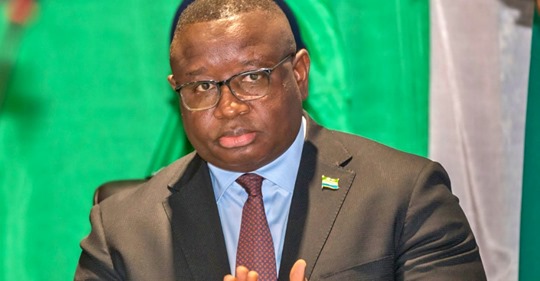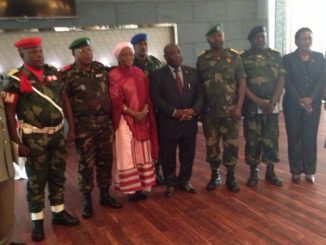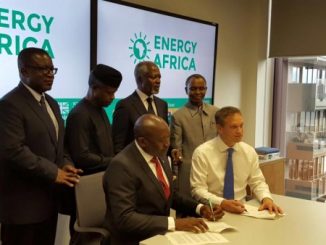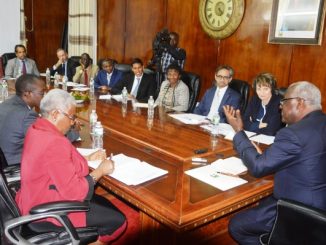
Maada Bio and Foreign Diplomats: A Failed Effort to Impress International Support
By Chernoh Alpha M. Bah and Matthew Anderson
Julius Maada Bio, the president of Sierra Leone finally met with foreign diplomats this past Thursday for the first time since he delivered his now infamous May 8 statement in which he called leaders of the country’s leading opposition party – the APC – as “domestic terrorists.” The May 21 meeting held at the country’s Presidential Lodge in Freetown comes amidst reported tensions between the Bio government and the diplomatic community due to the mass killing of unarmed prisoners at the country’s central prison on April 29 and the arrest of multiple opposition political figures, many of whom were held for weeks with no formal charges levied against them, in violation of the country’s constitution. The speech also follows mounting unrest punctuated by multiple protests in Lunsar and Tombo, where protesting youths were killed by armed security forces. Draconian Coronavirus regulations in the country – a national curfew and a range of lockdown measures that exacerbated poverty in an already stagnated economy – have also given way to multiple reports of police brutality and beatings of ordinary citizens.
MAADA BIO
In an earlier article, Africanist Press highlighted the growing rift between members of the diplomatic community in Freetown and the government of President Bio leading up to his May 8 “terrorism” speech, noting in particular the apparent abortion of a scheduled meeting between multilateral and foreign officials in the country with Bio to discuss the escalating violence in the country. The Africanist Press revealed that diplomatic officials in Sierra Leone, seriously concerned over the rising spate of violence across the country especially reports of the mass killing of an unknown number of unarmed inmates at the Freetown Male Correctional Center, were troubled by the inflammatory tone of the president’s May 8 speech. That speech was delivered just hours after the proposed State House meeting between foreign diplomats and the president failed to materialize despite a note verbale (a diplomatic correspondence) from the country’s foreign ministry addressed to members of the diplomatic community, including representatives of the EU, the IMF and World Bank, announcing the presidential invitation. State House officials kept sealed lips regarding the cancelled meeting, which was deliberately slated to occur on May 8, the day Bio delivered his explosive accusations of “terrorism” against the opposition in order to give the appearance of international endorsement of the speech’s controversial content. Thus, the subsequent State House silence about the non-materialization of the meeting was calculated to create the public impression that the diplomatic community fully supports the Bio government’s unproven allegations against the opposition. The objective of our publication on the cancelled diplomatic meeting was to reveal to the Sierra Leonean public that foreign diplomats in Freetown are completely unaware and absolutely in disapproval of the Bio government’s larger agenda to suffocate free speech and democracy in Sierra Leone.
Despite the treacherous effort to create the impression of diplomatic endorsement, Maada Bio and his squadron at State House are an isolated government when it comes to its ongoing crackdown on democracy and civil liberties in Sierra Leone regardless of the subterranean moves to push a dubious narrative of diplomatic approval to the unsuspecting public.
This past Thursday Bio did finally meet with foreign delegates at the Presidential Lodge. However, in yet another attempt to convey international support for his administration’s “anti-terror” measures, which have included the arrest of opposition figures, activists, and whistleblowers, Bio refused to allow the Sierra Leonean public a full report of the conversation by jostling journalists who have been invited to cover the proceedings: he refused the press an opportunity to openly hear from foreign diplomats present at the meeting. During the meeting, where remarks were made by only the president and other members of his administration, journalists were immediately ordered to leave the Presidential Lodge – the scene of the meeting– before foreign diplomats had a chance to offer their own statements about the progress of the day’s meetings. The move has been viewed by many activists and journalists as a serious affront to press freedom and a shocking break with established diplomatic protocols relating to meetings involving foreign dignitaries and host governments in democratic countries. In the United States, for instance, even after meeting with potentially critical foreign diplomats, diplomatic press conferences are held in the oval office of the White House to offer the public a chance to hear from all parties present. While diplomatic meetings tend to take place behind closed-doors due to their sensitive nature, after such meetings wherein a press conference is called (as was the case at Thursday’s event) it is the diplomatic norm to allow all parties present to address the media. Exceptions to this common practice occur only in authoritarian environments where host governments seek to censor foreign diplomats’ statements to the press.
Given the pattern of rising tension between the president and the international community, including calls from the UN and Amnesty International for independent investigations into the mass killings of prisoners at the Central Prison and the cancellation of the May 8 meeting, it is clear that the Bio administration is desperate to conceal its growing isolation from the international community. Bio’s speech at Thursday’s event, in a bold echo of his May 8 terrorism speech, again put words in the mouths of the diplomatic community, by stating that “every state the world over (including the UK, US, etc.) delegitimizes the use of criminal violence by persons or groups to intimidate the public and upend the rule of law. Where this directly targets state authority and the rule of law, it is declared an act of terrorism against the state,” going on to further say that “investigations have identified members of the All Peoples Congress party . . . as being responsible for the incitement and acts of violence.”
By so doing, and without allowing the public access to the reactions of diplomats to such wild accusations, he deliberately gave the false impression that the diplomatic community considers the recent youth protests and the fatal prison incident as “acts of terrorism” orchestrated by the APC thereby impressing the false notion that the Bio administration’s crackdown on lawful opposition is legitimately accepted by the diplomatic community. This was a sinister move made painfully obvious by the forceful removal of the press from the scene of the meeting immediately following the president’s speech.
While Bio struggles to create the impression of diplomatic support, it is important to note that key aspects of the speech only further betrayed the diplomatic community’s skepticism about government’s handling of the protests. In the short speech, comprised of 19 brief points, Bio repeatedly calls on the international community to recognize his characterization of the recent youth protests as acts of “terrorism against the state,” by stating that his government “expects an unambiguous condemnation of such criminal violence from our development partners.” Interestingly, since the end of the meeting on Thursday, ruling party propagandists and their supporters have been on an overdrive to create the impression that international support for Bio’s ongoing closure on free speech and democracy in Sierra Leone is proven by the presence of diplomats at the meeting. Social media vigilantes of the ruling regime have been circulating murky details of the meeting, the information itself hinges on the one-sided official narrative emanating from the press secretariat of the presidency. A terse press statement summarizing the details of the meeting attributes vague quotations to some of the diplomats, whom they claimed had criticized “all forms of violence in the country”; another dubious attempt to insinuate that the diplomatic community backed Bio’s unproven allegations and description of the ongoing violence to “domestic terrorists” acting under the sponsorship of the opposition. This state propaganda was in fact the front-page banner headlines of two pro-ruling party newspapers that boldly claimed on their Friday publications that diplomats have equally blamed the opposition for recent incidents of violence across the country.
What the propagandists cannot explain, however, is why a supportive diplomatic community had to be repeatedly commanded in the president’s speech to support the government’s actions or, more confounding, why the diplomatic community was not allowed, and as of today has yet to, openly state their support for the recent mass killing of prisoners and protestors, along with the arrest and ongoing detention of some APC leaders.
It is unthinkable for anyone to imagine that any serious foreign diplomat would back any host government that accuses a legitimate opposition party that commands more than 40% of the electorate of “inciting, planning, financing, mobilizing, and in some cases actively participating” in “carefully planned, coordinated, well-orchestrated and executed acts of violent terrorism,” when the host government hasn’t offered any evidence to substantiate such serious accusations. The fact that Bio’s effort to smear legitimate political opposition and silence pro-democratic voices in the country doesn’t meet the prior approval of the diplomatic community is obvious in both the statements he delivered on May 8 and during his subsequent meeting with diplomats on May 21.
In the May 8 broadcast, for example, Bio conclusively blamed the prison and youth protests in Lunsar and Tombo on concerted efforts by “domestic terrorists” on the APC party’s leadership. He provided no evidence for this conclusive accusation which he leveled against opposition leaders and supporters despite the fact that a supposed investigation into the prison massacre and the youth protests is still ongoing. Most absurd, perhaps, is the fact that Bio’s government recently ordered the arrested and detention of five foreign expatriate staff working for Sierra Leone Mining for alleged incitement over the Lunsar protests; an incident he earlier alleged was part of the violent disturbances sponsored by “terrorists” of the APC. How then can any investigation into the killings and protests be considered independent or legitimate when the President who ordered the said investigation has already declared who is responsible for the incidents before any investigation has been concluded? Further, how is the public expected to believe two simultaneously contradictory explanations: one, that youth protests in Lunsar were orchestrated by the APC and two, that those same youth protests were orchestrated by SL Mining officials? These conflicting explanations have nonetheless resulted in the unfounded arrest of opposition members and, now, foreign nationals working for SL Mining. Whichever way propagandists of the ruling party seek to explain this, the underlying truth is that the arrests have accentuated not only the dubious government claims of guilt, but also the impossibility of fair investigation by government into the recent deaths across the country.
It is obvious that ruling party officials, including the president, are desperate to criminalize legitimate political dissent and they have all concluded ahead of any so-called investigation that legitimate political opponents are to be blamed for rising youth protests in the country. They seek to label these legitimate critics of government and the pro-democratic voices in the country as “state enemies” and “terrorists” with the hope of canvassing international approval for their ongoing crackdown on democracy and free expression in the country. It is with this in mind that the Bio government’s hysteria and paranoia during last Thursday’s meeting has to be understood. And it explains why the press that has been invited to the Presidential Lodge to witness the meeting with diplomats were removed from the scene after Bio delivered his opening statement.
The lessons of the Rwandan genocide, and the implication of foreign diplomats in the mass killings of innocent Rwandan citizens, are enough to remind foreign diplomats of the essence of playing a neutral role in matters that fuel political tensions with risks of ethnic confrontation. Bio didn’t only muzzle the press during that meeting, but he equally suppressed the independent voices of diplomats present at the Thursday meeting. By so doing, he deliberately provided the basis for his press secretariat to exploit the mere presence of foreign diplomats at the Presidential Lodge to build a false one-sided narrative of diplomatic approval for his ongoing political repression against citizens. Ordinarily, ruling party officials are aware that foreign diplomats hardly come out to openly denounce a false press statement emanating from the presidency of the host country even where such presidential press statements deliberately misrepresent their diplomatic neutrality on a toxically divisive political controversy. The fact that State House officials would not allow a joint press conference with diplomats present at that meeting is enough proof to show that their ongoing efforts to criminalize the right to political association and right to free speech is without the approval of their international partners. They have only exploited the presence of foreign diplomats to mask Bio’s growing international isolation, knowing fully well that public knowledge of such lack of international support will only accelerate his already plummeting popularity.
For more information, read Africanist Press:




